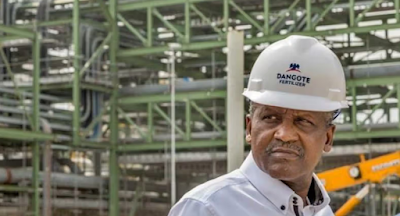The owner of the biggest refinery in Africa, Aliko Dangote, has urged the government to ban the import of fuels in line with its “Nigeria First” policy.
“The Nigeria First policy announced by His Excellency, President Bola Tinubu, should apply to the petroleum product sector and all other sectors,” Dangote said, as quoted by local media at an industry event, referring to the initiative launched earlier this year that bans government agencies from buying foreign goods if the same goods are available locally.Dangote went on to say that a lot of the imported fuel in Nigeria was of subpar quality that would not be allowed in other fuel markets.
“We are now facing increased dumping of cheap, often toxic petroleum products, some of which are blended to substandard levels that would never be allowed in Europe or North America,” Nigeria’s richest man said. Dangote also said that some of the fuels that enter Nigeria are produced with discounted Russian oil, which makes them cheaper than local fuels, which is unfair to local refiners.
The Dangote refinery, with a total capacity of 650,000 barrels daily and a price tag of $20 billion, was built to reduce Nigeria’s 100% reliance on imported fuels. The refinery began operation in 2024 and has been ramping up since then. In an interesting twist, this ramp-up has seen a temporary rise in U.S. crude oil exports to Nigeria in the first quarter of this year as domestic demand declined on refinery maintenance, making the oil more affordable for Nigerian buyers.
Any imports, however, are a threat to the Dangote facility, whose owner has an ambition to one day supply all of the fuels consumed domestically. There might even be some left to export, per the plans. Indeed, according to Dangote, Nigeria is currently a net exporter of fuels, with 1.35 billion litres of gasoline exported over the last 50 days.
By Irina Slav, Oilprice


